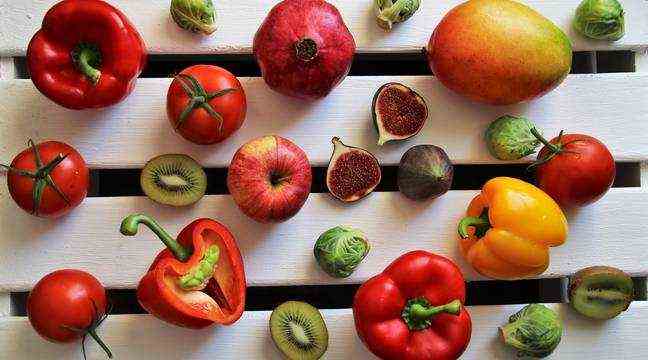Illustration of fruits and vegetables. – Pixabay
- The magazine of the National Institute of Consumption, 60 Million Consumers, has long been interested in organic.
- Its special edition, which comes out this Thursday, provides an overview of what we know today about organic food, its benefits… and its disappointments.
- The magazine, as usual, compared a hundred products in conventional and organic versions to see if it is really worth choosing all organic, and which brand.
Organic food, nine out of ten French people love it. About 73% consume it each month, and 13% every day. What has not escaped the brands. Flowering of specialized stores, emergence of dedicated departments, retailer brands that display the AB logo in bulk… There is no doubt that organic has imposed itself in France and will continue to grow.
But does organic necessarily mean green? And good for health? The latest issue of the magazine 60 Million Consumers, which comes out this Thursday, offers a dive into the organic world, its obligations and its limits. And 20 minutes gives you the four pieces of information to remember before filling your basket.
A problem of definition
Is it worth (and the cost) to spend more to eat organic? The dossier of 60 Million begins with a focus on the definition. There are two benchmarks in France (among others): the French label AB and the Eurofeuille, therefore on the European side. However, the two logos represent the same obligations.
That is often summarized as follows: prohibition of the use of synthetic pesticides and GMOs. What about processed products? They can only contain 5% non-organic ingredients (excluding added water and salt), and the list of food additives is reduced from 300 in conventional to 54 in organic. But the obligations go beyond pesticides. “The use of fallows, the seasonality of the products is respected,” explains Sophie Coisne, editorial coordinator of special issues of 60 Million Consumers. At the breeding level, there is a certain number of square meters devoted to the animal, certain mutilations cannot be practiced. “
Better for your health, really?
As we know, it is recommended to eat vegetables and fruits. But if your salads, carrots, apples and cherries are rich in vitamins… and pesticides, this could be a problem. “In its 2018 report, the European Food Safety Authority (Efsa) confirms an average contamination rate of 14% for organic food, against 47% for conventional, points out the magazine. As for the exceeding of the maximum residue limit (MRL), set by European regulations, it is observed for only 0.2% of organic products, against 2.8% of conventional. “
The problem is, looking closely, the difference between organic and conventional is not always obvious. “In general, raw organic products do not contain pesticides, slice Sophie Coisne. What is less easy is on processed products. There, we realize, especially with salty products, that the nutritional match is sometimes lost by organic. »With soups that contain fewer vegetables, lasagna with less tomato sauce…
But what is the real health effect of organic food? The debate is lively between specialists. Prospective studies, that is to say via the monitoring of cohorts of people who eat more or less organic, suggest that this is an asset. “More stable weight, less obesity, lower risk of certain cancers: a range of results tend to associate organic food with better health”, concludes the magazine. “But that remains to be explored, nuance Sophie Coisne. Studies are relatively recent and scarce. And difficult to analyze. Organic consumers have a particular profile: they smoke less, drink less… ”
Organic, yes, but green?
What about the carbon footprint? About 18% of organic products arrive from our European neighbors, and 15% are stamped outside Europe. If the products from the EU (and some from elsewhere) are not “less organic” (they are subject to the same European regulations), it is likely that your organic oranges or apples have flown from the Andalusia. Eggs, milk, yoghurts and organic poultry, on the other hand, are 100% of French origin, the dossier reveals.
Another question: heated greenhouses, very energy intensive. Since 2019, it is forbidden in France to sell as organic products from heated greenhouses between December 21 and April 30. In fact, there is tolerance. “But regulations are changing,” assures Sophie Coisne. A new European regulation is planned for January 2022, taking into account the climate and environmental impact for the first time in the concept of organic. So transport?
Is it really better to buy in specialized stores?
About 55% of organic products are purchased in supermarkets. “But we must defeat the conviction that it would be a discount organic”, nuance the one who coordinated this issue. Admittedly, the large distribution posts prices between 15 and 20% lower than the brands of the specialized chains. But it respects the same standards. “On the other hand, it plays on the additional points that organic enthusiasts appreciate: the origin, the seasonality of the products, the fair remuneration of producers,” explains Sophie Coisne. Or on the number of additives, more important than in specialized brands. “
What really makes the difference between large distribution and specialized circuit, it is therefore rather the ecological and fair side. Biocoop will thus sell only seasonal products and with fair remuneration for producers. “Specialized circuits see the steamroller of mass distribution with a negative eye, but this has increased the influx of customers to organic, therefore at home,” says Sophie Coisne. Who points out that for the moment, the large chains which have opened specialized stores, such as Auchan bio or Carrefour bio, have not succeeded in attracting customers.

